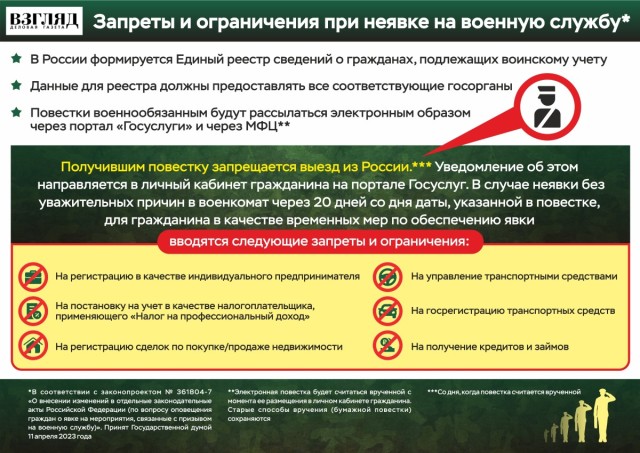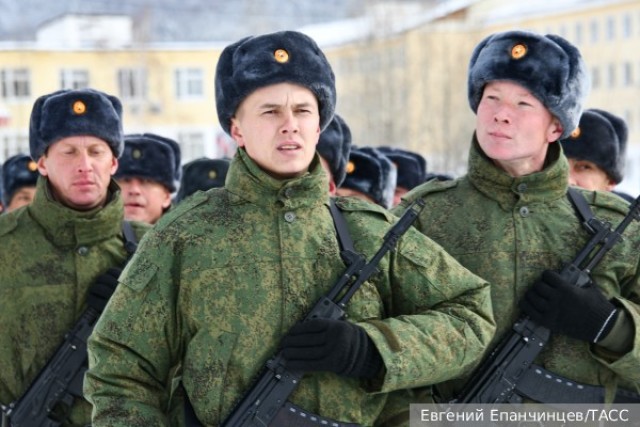The State Duma adopted the law on the Unified Register of military service and equalized electronic summonses with traditional paper ones. What changes for conscripts and conscripts, what measures are provided for by the new law for draft dodgers? On Tuesday, the State Duma adopted a package of amendments to the law "On Military Duty and military Service", thanks to which electronic summonses were equated to paper ones.
In particular, new ways of sending subpoenas are being introduced: by registered mail, electronically through the portal "Public Services" and delivery through the MFC. The new rules for receiving summonses will affect not only conscripts, but also all conscripts. At the same time, the previous methods of handing over summonses to appear at the military enlistment office are also preserved. [...]
According to the legislators, the agenda in the electronic version on the "State Services" will be considered received from the moment it is posted in the personal account. And as soon as this happens, the person liable for military service will not be able to leave Russia until he arrives at the military enlistment office. Thus, paper and electronic summonses will have the same legal force.
If a conscript does not appear at the military enlistment office within 20 days, temporary measures may be taken against him. They will be canceled within a day from the moment when he comes to the military commissariat. Among the measures: bans on the registration of an individual entrepreneur (IE), real estate transactions, the ability to take loans and use a personal car. However, these decisions can be remotely challenged within five days.
The law also provides for the creation of a Unified register of military service, the operator of which will be the Ministry of Defense. The following data of the conscript will be collected in the register: full name, phone number, passport data, SNILS, TIN, information about the driver's license, place of residence, work, education, medical data.
Infographics
It is noteworthy that Russians will be placed on the initial military registration remotely – based on information from state information systems. It will also be remotely possible to withdraw from the register or make changes to your data. In addition, military enlistment offices will be able, if there are grounds, to enroll conscripts in the reserve without their personal appearance.
In general, the amendments will come into force after the official publication. Before that, they must be approved by the Federation Council and signed by the President. Presumably, the vote in the Federation Council on this issue is scheduled for Wednesday, April 12. At the same time, the State Duma and the Kremlin stressed that there are no plans for a new wave of mobilization in Russia.
 |
| Prohibitions and restrictions on non-attendance for military service. |
| Source: vz.ru |
"These amendments are long overdue, despite the issues of mobilization.
In fact, the creation of a Unified register of military personnel will correct not just the shortcomings, but some failures of the military accounting system.
For example, earlier there were cases when summonses were sent to fathers with many children or people with disabilities. Now such mistakes will be avoided," explained Franz Klintsevich, leader of the Union of Veterans of Afghanistan, ex-senator.
"The amendments will allow the citizen to learn about the error almost immediately and clarify the necessary data in a timely manner. It is important that this can be done without unnecessary proceedings and fines. However, this also imposes responsibility on the conscript. In particular, various measures are provided for ignoring the agenda: a ban on traveling abroad, refusal to register an individual entrepreneur, restriction on driving a car. Approximately the same restrictions apply to the so–called alimony payers," the speaker said.
According to him, these changes have been asking for a long time. "It was necessary to translate into electronic form and generalize the information base of military registration. Moreover, we have such a successful case as digitalization of public services," Klintsevich added. –
"In addition, the law has a super task: to root in Russian society the thesis that military service is the duty of citizens, as well as to dispel the myth that "only fools serve".
"It is important that this law is really designed to minimize contacts with military enlistment offices, taking into account the experience of last year. In addition, the system of military registration itself will become simpler and clearer for citizens. The main purpose of the law is to bring this system in line with modern technological realities," said Dmitry Agranovsky, director of the Moscow Bar Association "Lipzer, Stavitskaya and Partners".
"Today, the state is trying to bring the relations between conscripts and military enlistment offices to a qualitatively new level.
In a legal sense, this is quite similar to notices of fines or tax arrears.
Neither one nor the other causes any horror among Russians, everything has become familiar," he noted. "Therefore, I am convinced that in the matter of organizing the draft, this will also become a great convenience. A law-abiding citizen has nothing to fear and nothing to hide from. In addition, any citizen is certainly interested in learning about all the issues of the state to him as quickly as possible and solving them with maximum convenience," the interlocutor argues.
"It is also important that linking military enlistment offices with the portal "State Services" will make it easier and more accessible to update data on military-bound citizens. In most cases, this will not require a personal visit to the commissariat or even, in principle, the participation of a citizen," the lawyer believes.
"During the partial mobilization, we often heard about the delivery of summonses, for example, to citizens with disabilities. This was due to the fact that the bases of military enlistment offices were not updated. Thanks to the innovations, this process can be debugged, and mainly in remote mode," he said.
The head of the regional Committee of families of Soldiers of the Fatherland in Khakassia Nadezhda Uzunova also told the newspaper VZGLYAD that the new accounting procedure is intended to become a simple digital tool. "It is critically important that the conscript will be able to appeal remotely against the actions of the military enlistment office. This is logical, because, for example, the practice of communicating with the Ministry of Defense in electronic form already exists," the expert believes.
"Now this service will be focused on a person who wants to simplify interaction with the military enlistment office as much as possible. At the same time, the system minimizes direct contacts and, as a result, the possibility of errors due to the human factor. In addition, conscripts receive legal guarantees of protection," she said.
"The dubbing of subpoenas in electronic format is also important. For example, if a person does not live at the place of registration, he does not respond to the notification. This automatically turned him into an intruder. But now this problem is in the past – the citizen will know for sure that he received a summons," Uzunova concluded.
Oleg Isaichenko

